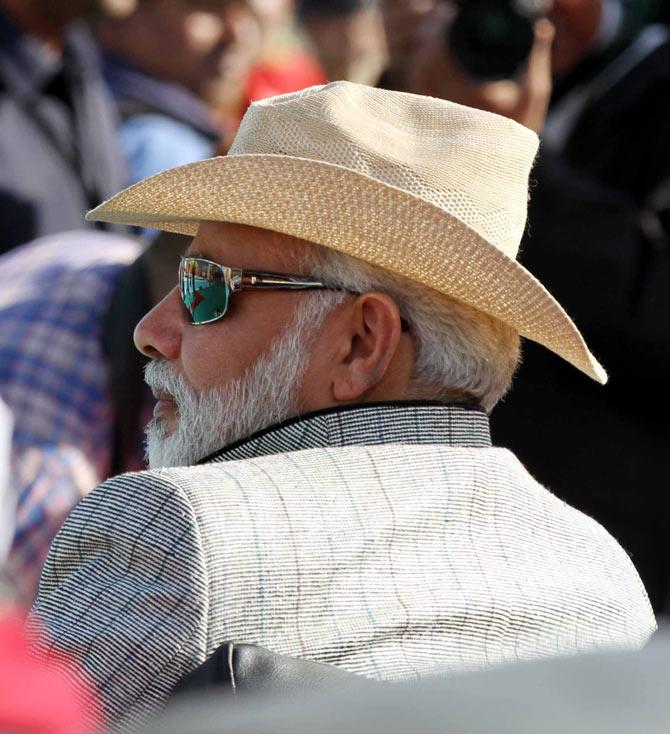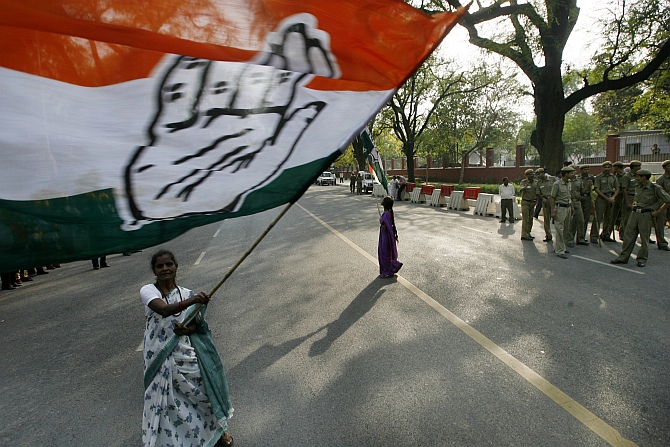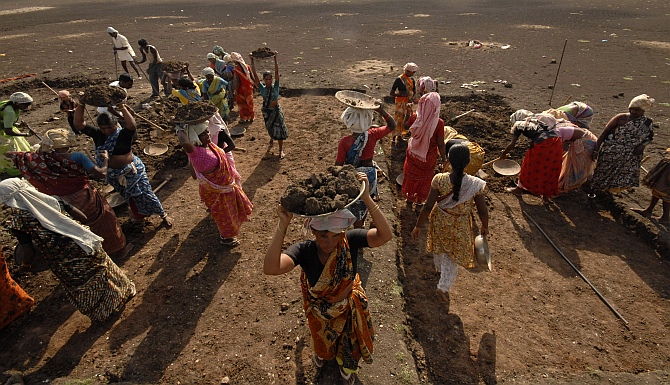 | « Back to article | Print this article |
'Forget NaMo, it's RaGa that counts'
Jairam Ramesh insists it is premature to write the Congress’ epitaph in 2014 because 10 years of incumbency have also seen some sterling performance. Aditi Phadnis reports.
All Rural Development Minister Jairam Ramesh wants to talk about was land acquisition. All I want to talk about is the forthcoming Congress election campaign and the liabilities with which the ruling coalition was saddled: laws (especially the ones that take their own course), outlaws, in laws.
We manage to strike a middle course over soup and cutlets for him and open sandwiches for me at the oh-so-politically-correct Ashok Hotel coffee shop, the Samovar.
“Modi is a case of premature articulation," he says, laying on the nudge-nudge-wink-wink with a heavy hand. "There are national and state-level issues that are part of any election campaign and there are several assembly elections still to go before the Lok Sabha elections. The campaign for the national elections will pick up only after that. So Modi's pitch is too much 'I Me Myself' too soon," he elaborates.
But he adds while the Congress was fighting multiple challenges, it was the Bharatiya Janata Party that was the principal challenge in most states.
"But when you said the BJP was an ideological challenge, your party completely flattened you," I point out, recalling media committee chairman Janardan Dwivedi's public reproof of Ramesh when he described Modi as an ideological challenge to the idea of India.
"I'm not sure if my party flattened me, or certain individuals. I'm not so sure…," he replies, making his opinion of this particular oligarch in his party quite clear.
Apparently reconciled to the fact that his showpiece, the Right to Fair Compensation and Transparency in Land Acquisition, Rehabilitation and Resettlement Bill, 2013 was not going to be discussed, he launches into what he thinks the Congress's campaign would - and would not - be.
In 2003, it was Ramesh who wrote Congress President Sonia Gandhi's address to the Confederation of Indian Industry. In that she made the point (among other things that the Congress would do if it came to power), that social bigotry cannot go hand-in-hand with economic liberalism.
Click NEXT to read further...
The Congress deals with hope; the BJP deals with hype
"But it can. The people of Gujarat haven't voted the Congress to power three times successively. It is Modi, whom you call bigoted, that they've voted for," I point out. Ramesh interrupts me with talk of the BJP's declining vote share, but realised he might be on sticky ground.
So he begins talking about the language, cronyism and corruption of 1920s and 1930s Germany. "You have cronyism as well: a son-in-law who leverages his position with powerful people," I intervene laconically. He looks at me askance, asking me whether I was hosting him for lunch, or what?
Ramesh is right. I've been too combative. Briefly, it's time out. Lunch is - adequate. He douses his cutlets with ketchup. I ask for the mustard. He gets French fries, I only get boring crisps.
I remind him about the 2004 election, that he, along with a core team, orchestrated from a tiny two-room flat on North Avenue that had only one loo, so, Ramesh and his team would have to rush to the Claridges Hotel in New Delhi when nature called.
"In 2004, we were opponents. We had nothing to lose," he says, describing the Congress as a "deep discounted bond" in 2004.
Sonia was the only person who kept telling the team: don't give up, fight on, push on. That was the beginning of the aam aadmi (common man) campaign, though Ramesh recalls that there were many who felt even this was a dilution: the Congress had always been for the garib aadmi (poor man), so how could it now upgrade to the aam aadmi?
But there were many, who now occupy several locations on Raisina Hill ("multiple locations," he repeats with a meaningful look: he meant the highest point on that particular promontory), who shared the belief that the Congress wouldn't make it in 2004 or 2009.
Using the same logic, Ramesh says, it was premature to write the Congress' epitaph in 2014. There had been 10 years of incumbency, but also performance. "The Congress flounders when it comes to hype. The Congress deals with hope; the BJP deals with hype," he says, laughing delightedly at his own witticism.
Click NEXT to read further...
'Rahul is creating grounds for a new leadership'
I share some common misgivings about the Congress leadership: nobody ever knows what they're thinking. "We don't know what Prime Minister Manmohan Singh thinks, what Sonia Gandhi thinks, what Rahul Gandhi thinks… what does he think? What does he do?"
"Contrary to what you believe, the Congress vice-president is very hands-on. He's uncomfortable in the glare of the media and has quietly done some transforming of structures and institutions that you people never write about," Ramesh answers primly.
“The Rajiv Gandhi Mahila Vikas Pariyojana in central and eastern UP has 500,000 women as members. They are linked together such as the Andhra Pradesh model in self-help groups, and milk procurement in UP has increased several times over because of these groups. They have backward linkages with banks and their incomes have gone up substantially. The other sterling intervention by the vice-president is to begin democratising the Congress so that now there are 20 per cent completely new members of the NSUI [National Students Union of India] and the Indian Youth Congress, from non-Congress families. He is creating grounds for a new leadership that comes from below."
Ramesh has begun to sound pious and boring, so I change the subject: What will the Congress' campaign plank in 2014 be? "Too early," is his instant response. "But don't underestimate the resilience of rural India," he adds. "We have our task cut out for us in urban India - although we swept urban India in 2009, it will be hard to repeat that."
So if you swept urban areas in 2009, why have you lost ground so badly, I ask. "Because of the bhumihar from Ghazipur," he said. He was referring to the Comptroller and Auditor General, Vinod Rai, who came out with reports on the allocation of telecom spectrum and contracts for the Commonwealth Games that pointed to significant scandals.
But, I point out artlessly, the 2G spectrum scam was not only about presumptive loss. It was also about what happened in a room when only a handful of people knew it was going to be "first come first served" to get the licence.
Click NEXT to read further...
'You can't do a 'U'-turn on the aam aadmi'
Now Ramesh changes his tune: "I don't know if what Raja [A Raja, the telecom minister who went to jail] did was right or wrong. But it was the combination of an aggressive CAG and an aggressive judiciary, both basing themselves on a faulty understanding of the issue."
So the issues in 2014 are… what? More socialism?
"Well, you can't do a 'U'-turn on the aam aadmi," Ramesh says, shocked that such a thing could even be suggested. "We cannot go back on the past. At the same time, the past can't be our only plank. Since 2004 we have consciously replaced an entitlements-based regime with a rights-based one". He enumerates the rights.
I'm resigned to the fact that I will have to listen to a campaign speech by Ramesh and stay politely silent. The land Bill, he says, is not for land purchase: it is for land acquisition. If you want to purchase land, you negotiate and buy it. The state won't come in the way. But if land is acquired, fair compensation has to be paid. How this is done is up to the state governments.
He concedes that a lot depends on delivery - reform of the public distribution system and the Direct Benefits Transfer changes. And he also says the scheme will take at least two years to roll out on an all-India basis. But "by October all pension payments, all Mahatma Gandhi National Rural Employment Guarantee Act payments, all government scholarships in Andhra Pradesh will be DTH - Direct To Home," he predicts. "By November this could be extended to Jharkhand."
Ramesh is upbeat and jovial now. As we start getting up, he tosses me his final line: "The music of Indian politics is based on Congress's RaGa. Forget NaMo, it is RaGa that counts." "The Congress has the achievement. What it has to change is the sentiment."
TOP photo features you missed last week
Click on MORE to see another PHOTO features...




